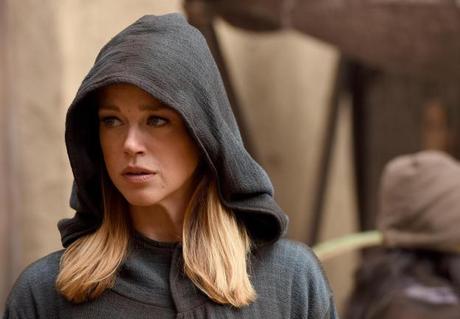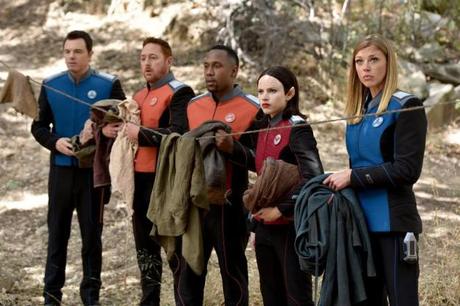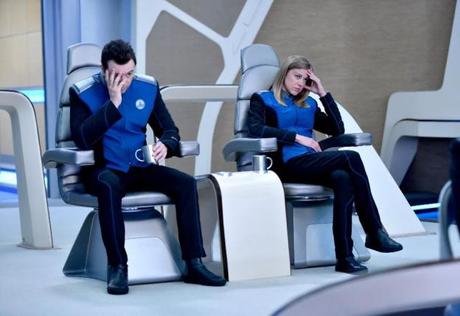The Orville could have ended its first season any number of ways. In fact, after the show's first couple of episodes, I would have bet several bars of latinum we were heading toward a Union-Krill war. However, that appears to have been back burnered for next season. Instead, Seth MacFarlane and Brannon Braga chose to close things out by circling back around to where it all began: Ed and Kelly.
As "Mad Idolatry" opens, Ed wanders the ship in search of someone to hang out with, realizing along the way just how lonely he is and how much he truly misses being with Kelly. Luckily, she feels the same way. An innocent drink together leads to a full date which leads to a recoupling. That is until Ed attempts to cover for Kelly when she screws up on an away mission, and the ensuing conflict ensnares both of their careers and leads the crew to take extreme measures to find a resolution. By the end, Ed and Kelly conclude they can't actually work together AND be together at the same time because their love for each other compromises them as officers.
While this inevitable relationship drama has a bit of a "let's milk this and keep the will-they-won't-they going a little longer" feel, the primary plot is classic Trek. Kelly uses her med-tech to heal a little girl on a primitive planet and accidentally lets herself be seen by the girl's entire tribe before retreating into the woods and back to her shuttle. No big deal, Ed figures. A small mistake. How much harm could it actually do?

A lot, as it turns out. Just like Twilight Zone, Voyager's "Blink of an Eye" or any number of other sci-fi spins on this tale, Kelly's innocent mistake results in an entire civilization worshipping her as a god, thus turning the story into a commentary on religion (opiate of the masses, source of perpetual conflict and division, something to be evolved from in a more science-driven future and all that...the usual tropes). The Orville gets to witness its own version of The Sims, watching from orbit as the planet below evolves 700 years every 11 days, the explanation for the time disparity coming down to the planet rotating between two separate universes. When it's in The Orville's universe, time runs normally; when it's in the other universe, time moves quicker.
This leaves the crew a relatively small window to fix things. Kelly's effort to course-correct and directly explain herself to the planet's people simply results in one religious leader killing another. To set the planet back on track, the crew has no other option than to leave Isaac behind during one of the 700-year periods in the other universe. The gambit works, but stranding a crewmember on a planet for 700 years is not exactly the kind of thing they can ever do again to cover up another accident, or so Kelly tells Ed when breaking up with him.
It's all so familiar, yet just new enough to remain engaging.

That just about describes the entirety of The Orville to this point. Tone deaf rape allegory episodes, occasionally flat sci-fi storytelling and comedy/drama imbalances aside, The Orville remains the most recognizable Star Trek show on TV right now. Star Trek: Discovery is valiantly attempting to take the franchise in new directions and functions as the first TV iteration to take more of its cues from J.J. Abrams than Gene Roddenberry. The Orville, by comparison, worships at the tonal and story format altar of The Original Series and all of its spinoffs. The entire series is imbued with classic Trek 's delightful spirit of optimism, lust for discovery and willingness to use the genre to offer social commentary.
While I generally find this familiarity comforting, I'm also eager to see the show evolve and continue to distinguish itself. Even though the phrase "prime directive" is never actually uttered, "Mad Idolatry" is clearly Orville doing a solid cover song version of Star Trek, albeit with a somewhat more overt statement on religion than even "Blink of an Eye" offered. The mindfuck horror imagery of "Firestorm" (Alara's Alien episode) and the Black Mirror inspired dystopia of "Majority Rule," on the other hand, serve as windows into what Orville can become when it mixes in other influences. I look forward to more of that next season.
At the start of the season, I watched The Orville because it was preferable to simply re-watching old Trek episodes again. Here at the end, I've reached a point where I watch The Orville because I genuinely like The Orville, even though the show sometimes fails to fully think through some of its ideas. What started out as Seth MacFarlane's glorified Star Trek cosplay has evolved into something which is right on the cusp of a dramatic breakthrough.
THE NOTES & NITPICKS
- FYI: The half-naked Ensign at the beginning was played by Kyra Santoro, a Sports Illustrated Swimsuit Edition model.
- Latchkum! Laughed pretty hard when that knife suddenly pierced Ed's hands.
- Bad cook, eh. Maybe the ship needs a chef. Paging Neelix.
- The peanut butter and jelly sandwich is apparently the cockroach of foods. It will outlast us all.
- Why exactly are we supposed to believe the society progressed as it normally would have even without Isaac's presence? Maybe they would have moved past Kelly-worship eventually, but he upped their timeline, right?
- Interesting touch having the spokespeople for the more evolved version of the planet both be people of color whereas the two religious leaders from the earlier, fear-driven iteration of the civilization were all white dudes.
- Reminder: They produced 13 episodes, but Fox decided to pull one of them to ensure the season could conclude in 2017 and not spill over into next year. The pulled episode will now air as part of season 2.
- Best Episodes: "Firestorm," "About a Girl," "Majority Rule"
- Worst Episodes: "Command Performance," "Cupid's Dagger," "New Dimensions"
- Best Characters: Alara, Bortus, Isaac
- Worst Characters: LaMarr, Malloy
- Best Surprise Guest Star: Robert Picardo
- Worst Surprise Guest Star: Rob Lowe
- Best Joke: "This is going to sound like I'm talking out of my ass"/ "Then please enunciate."
- Worst Joke: The ongoing pickle jar puns Ed made about Alara being stronger than him.
That's a wrap on Orville: Season 1. Thanks for reading my reviews and debating with me in the comments section. So, where do you fall on the season as a whole? And did you like "Mad Idolatry"? Let me know in the comments.

